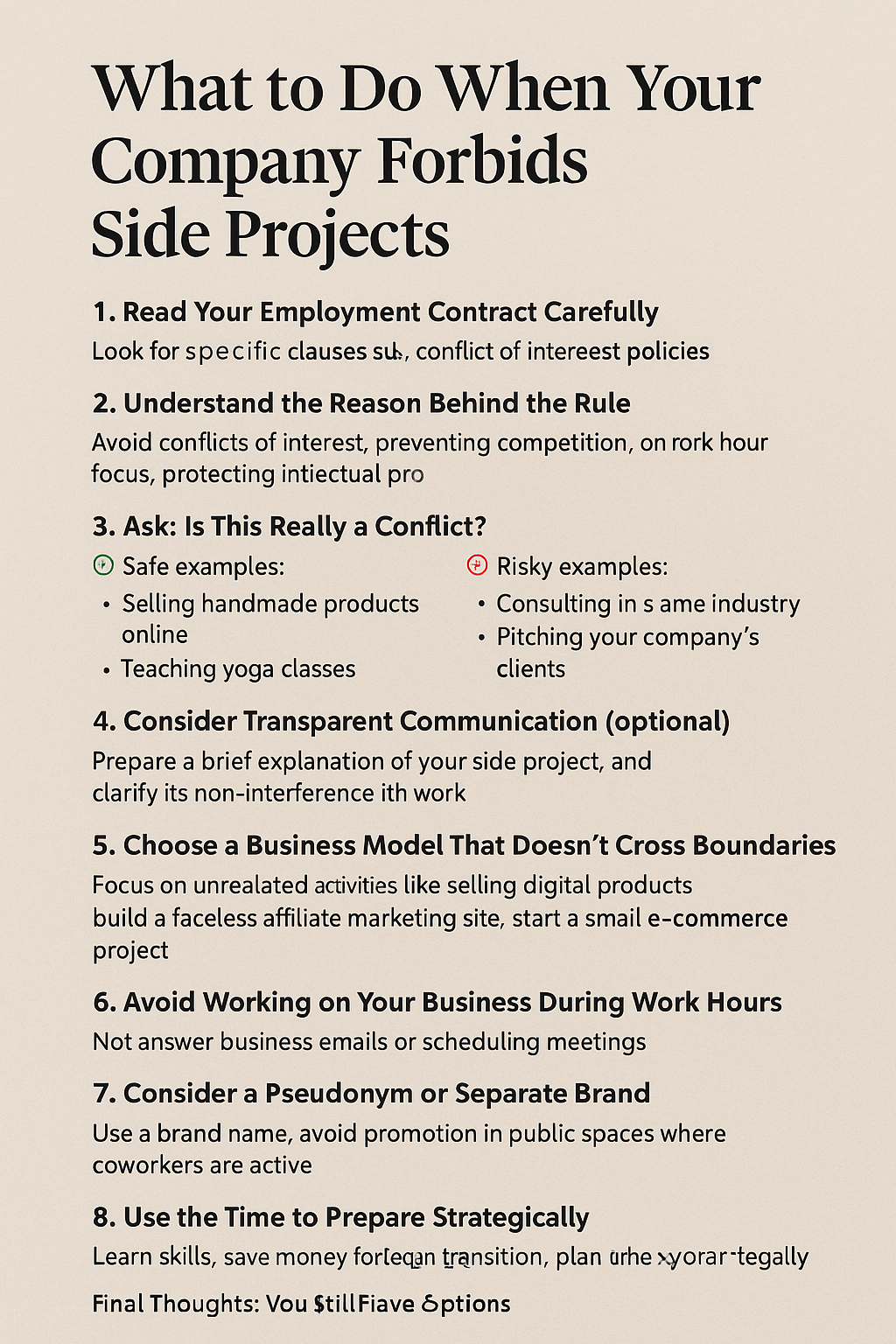You’re working full-time, have a great business idea, and are ready to begin—only to realize your company doesn’t allow side activities or businesses. Now what?
If your employment contract includes restrictions on outside work, don’t panic. You still have options. In this article, you’ll learn what to do if your company forbids side projects, and how to move forward legally, ethically, and strategically.
Step 1: Read Your Employment Contract Carefully
Before making any assumptions, go back and read your contract. Look for clauses such as:
- Non-compete agreements
- Conflict of interest policies
- Disclosure requirements
- Exclusivity clauses
Pay attention to language like:
- “Employee shall not engage in other paid work…”
- “Any business activity must be previously approved…”
- “All inventions during employment belong to the company…”
If anything is unclear, consult a legal expert before taking action.
Step 2: Understand the Reason Behind the Rule
Companies usually restrict side businesses because they want to:
- Avoid conflict of interest
- Prevent competition
- Ensure focus during work hours
- Protect intellectual property
Understanding their reasoning can help you work around it without breaking trust or rules.
Step 3: Ask: Is This Really a Conflict?
Some side projects may still be allowed if they:
- Happen completely outside work hours
- Don’t use company tools or resources
- Aren’t related to the company’s industry
- Don’t involve clients, contacts, or data from your job
✅ Examples that may be safe:
- Selling handmade products online
- Writing a fiction e-book
- Teaching yoga classes on weekends
- Building a blog about parenting
🚫 Risky examples:
- Consulting in the same industry
- Using inside knowledge or tools
- Pitching your company’s clients
Step 4: Consider Transparent Communication (Optional)
If the company’s policy isn’t too strict and you feel comfortable:
- Prepare a brief explanation of your side project
- Clarify that it won’t interfere with your work
- Emphasize that it’s unrelated to the company’s industry
- Ask if formal approval is needed
Sometimes transparency builds trust and flexibility.
If you’re not comfortable or suspect the answer will be “no,” you may prefer to wait or build in silence.
Step 5: Choose a Business Model That Doesn’t Cross Boundaries
Stay clear of your employer’s interests by focusing on unrelated activities, such as:
- Selling digital products (e-books, templates)
- Offering personal development coaching
- Building a faceless affiliate marketing site
- Creating an anonymous newsletter
- Starting a small e-commerce project
These allow you to grow quietly and independently.
Step 6: Avoid Working on Your Business During Work Hours
Even if your business is unrelated, you must:
- Not answer business emails during your job
- Avoid side work on the company laptop or Wi-Fi
- Not schedule meetings that interfere with your day job
- Keep all communication and documents 100% separate
Respect is protection.
Step 7: Consider a Pseudonym or Separate Brand
If your employer monitors your public activity, consider:
- Starting under a brand name (not your personal profile)
- Using a logo or initials instead of your photo
- Avoiding promotion in public spaces where coworkers are active
This gives you time to build without unnecessary friction.
Step 8: Use the Time to Prepare Strategically
If you can’t launch now, use the time to:
- Learn skills (copywriting, digital marketing, design)
- Build content or audience anonymously
- Develop your product quietly
- Save money for a clean transition
- Plan your exit strategically
Preparation today = freedom later.
Final Thoughts: You Still Have Options
A restrictive job contract doesn’t mean the end of your entrepreneurial dream.
✅ Understand the rules
✅ Respect your role
✅ Build strategically on the side—or in silence
✅ Use this season to prepare, learn, and lay your foundation
When the time is right, you’ll be ready to step into your business fully—and with peace of mind.



Deixe um comentário